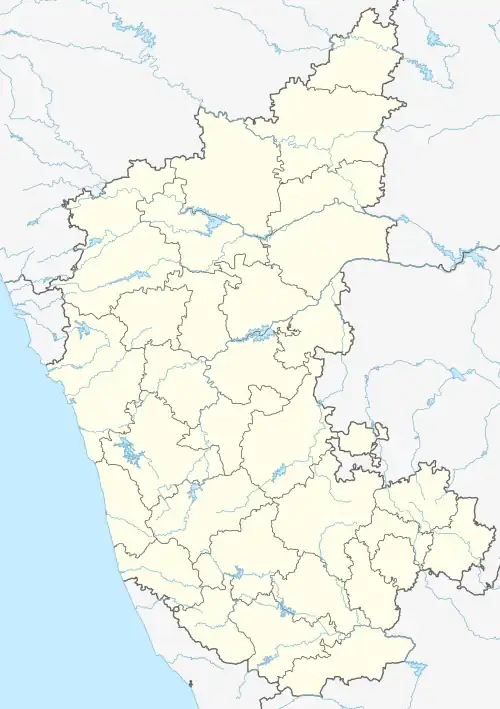Dyampur
Dyampur is a village in the southern state of Karnataka, India. It is located in the Yelburga taluk of Koppal district, Raichur.[2] Previously a part of Salar Jung's jagir, which included most of Koppal and Yelburga taluks in erstwhile Hyderabad state. This village was also birthplace of "Kaviratna" Chennakavi, Pandit Kallinathakavi and poet Kavyananda.[3][4]
Dyampur | |
|---|---|
village | |
 Dyampur Location in Karnataka, India  Dyampur Dyampur (India) | |
| Coordinates: 15.508061°N 75.966644°E | |
| Country | |
| State | Karnataka |
| District | Koppal |
| Talukas | Koppal |
| Government | |
| • Body | Village Panchayat |
| Area | |
| • Total | 9.031 km2 (3.487 sq mi) |
| Population (2011) | |
| • Total | 1,745 |
| • Density | 190/km2 (500/sq mi) |
| Languages | |
| • Official | Kannada |
| Time zone | UTC+5:30 (IST) |
| Postal Index Number | 583232[1] |
| ISO 3166 code | IN-KA |
| Vehicle registration | KA |
| Nearest city | Koppal |
| Civic agency | Village Panchayat |
| altitude | 1750 feet |
| Website | karnataka |
Village description
Physiography and location
The villages lies in a dry yet plain and fertile belt between Krishna[lower-alpha 1] and Tungabhadra[lower-alpha 2] rivers, a region known as Raichur Doab. The average altitude of the village is 1750 feet, with its exact coordinates being at 76° 10' E longitude and 15° 13' N latitude. It receives 23 inches of rainfall every year, mostly between the period starting from second week of June to October.[5]
It is bordered by villages of Rajur in the north, Kuknoor in south, Harishankarbandi in the east and Chikenkop in the west. The nearest railway station is located in Bhanapur around 8 miles away. The taluk headquarters at Yelburga is located 9 miles away and district headquarters at Raichur is located 120 Miles away. The village lies in proximity of several historically important cities and towns, most notably Hampi, once the capital of mighty Vijayanagara Empire lies just 35 miles away from the village. The village covers a area of 2324 acres or 3.6 sq. miles.[5]
Agriculture
There are 3 distinct types of soils found in the village:
- The fertile red soil known as Masari
- Black soil known as Yeri
- A mix of above (red and black) known as Garabu [5]
The red soil belt lies in the immediate neighborhood of the village, consisting of 1/3 of the total arable land in the village, used to grow crops like Jowar, groundnut and pulses. While black soil belt is found further outside the village. The Garabu mixture of soil lies in between two soil belts.[5]
The main grown crops in the village are Bajra, Jowar, cotton, Mavare, Toor, Niger seed, horsegram, saltlower, Bengal gram, greengram, sesamum, Jinseed, wheat and oilseeds. The main grown vegetables are lady's fingers, Brinjal, beans gourds, cucumber pulses and leafy vegetables.[5]: 5–21
Fauna
There are a number of animals which can be seen in the area such as rabbits, jackals, deer, reptiles, rodents and among birds the common ones are parrots, eagles, crows and owls.
Temples
There are many temples in the village most important of these are temples of Mahamuyi, Maruti and Eswara, located in centre of the village. And most of village houses are clustered around these, while being surrounded by a fort wall. The Dyamavva temple is located in the eastern side.[5]
See also
References
- "Dyampur Pin Code | Postal Code (Zip Code) of Dyampur, Koppal, Karnataka, India". www.indiatvnews.com.
- Schouten, Jan Peter (31 December 1995). Revolution of the Mystics on the Social Aspects of Virasaivism. p. 305. ISBN 9788120812383.
- General, India Office of the Registrar; Registrar, India Office of the (22 August 1965). "A Guide to the 1961 Census Publication Programme". Manager of Publications. p. 113 – via Google Books.
- "Karnataka State Gazetteer". Office of the Chief Editor, Karnataka Gazetteer Department, Government of Karnataka. 22 August 1983. p. 1347 – via Google Books.
- Balasubramanyam, K. (1976). Census Of India(1961) XI: Mysore Part VI Village survey monographs no 27 Dyampur village (PDF). The Controller Of Publications.
- flows from the north
- flows from the south
External links